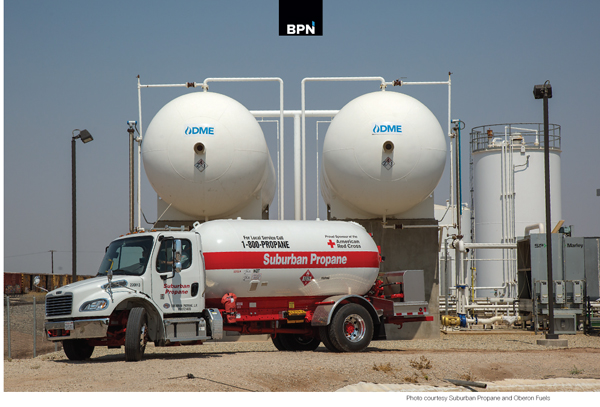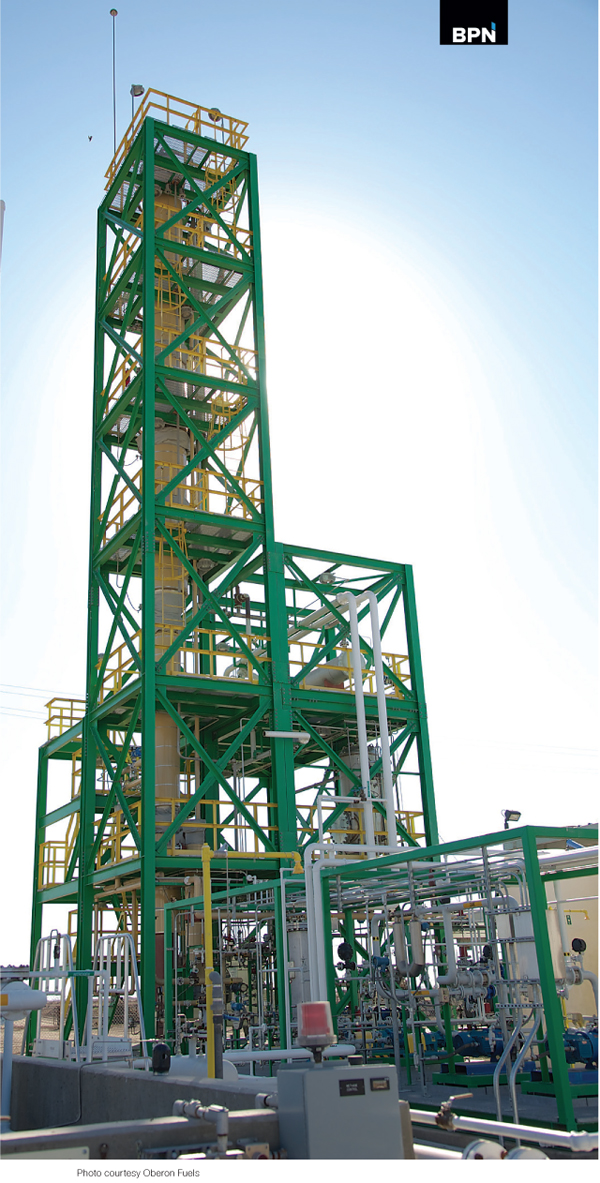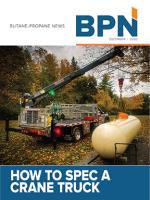Thursday, December 3, 2020
While continuing to promote propane autogas as a clean fuel for transportation, Suburban Propane Partners LP (Whippany, N.J.) is also supporting the development of an even cleaner, renewable alternative.

The company has acquired a 39% stake in Oberon Fuels (San Diego, Calif.), a development-stage producer of renewable dimethyl ether (rDME) transportation fuel. Suburban Propane has also committed to provide additional funding to support continuing development efforts to begin commercializing an rDME/propane blended product. The company will have the exclusive rights to work with Oberon to market and sell rDME and rDME/propane blends in the United States, Canada, and Mexico.
The initial customers for the blends are likely to be over-the-road transportation fleets, especially those that are in California and those that are already fueled by autogas. “There are plenty of fleets to go after and the low-carbon fuel incentives are most advanced in California,” Michael Stivala, president and CEO of Suburban Propane, told BPN. He said other customers may include fleets that are using diesel or gasoline, but want to convert to a lower-carbon alternative fuel.
Rebecca Boudreaux, Ph.D., president and CEO of Oberon Fuels, added, “We are expanding the use of DME because it is recognized as a powerful way to decarbonize transportation, and the propane industry is well prepared to distribute it.”

WHAT IS rDME?
DME is a synthetically produced fuel that can be generated from natural gas or biogas. Like propane, it can be stored as a liquid under moderate pressure. It has been used around the world for three decades. In Asia, it is blended with propane and used as a cooking fuel. In the U.S. and Europe, it is used as an aerosol propellant. DME is also being investigated as a diesel alternative for passenger cars and agricultural equipment. rDME blends are being tested in autogas vehicles, and Boudreaux expects they can be used there with no modifications to the vehicles or infrastructure.
rDME produced from food waste has a carbon intensity (CI) score of -5, and rDME produced from dairy manure has a CI score of -278. “The carbon intensity depends on the feedstock,” Boudreaux explained. “Dairy manure, for example, is normally flushed into a pond and its emissions are released into the atmosphere.”
When it is instead used to produce dairy manure-based rDME and then combined with propane, it lowers propane’s CI score. Propane has a CI score of 83. With a 5% blend of rDME, propane’s CI score can be lowered to 65, and with a 20% blend, it can be lowered to 11.
ANNUAL PRODUCTION OF 1.6 MMGAL. EXPECTED
Oberon Fuels, which was founded in 2010 and began producing fuel-grade DME in 2013, expects to begin production of rDME from pulp mill waste in 2021. The annual production capacity is estimated at 1.6 million gallons.
While there is a lot of work to be done to get production off the ground and to introduce the rDME/propane blends in transportation, the next potential market could be forklifts. Like over-the-road vehicles, these are eligible for California’s low-carbon fuel credits. Beyond that, once the product is on the market and proven, its use could be expanded to other applications.
“The pathway to zero emissions is better with the blended product,” Stivala said. “There is a dramatic impact on air quality when you blend DME with propane, and an even bigger impact if you blend DME with renewable propane.”
“The ultimate panacea for the industry would be commingling the product with propane in the many applications in which propane is utilized,” he concluded. — Steve Relyea

The company has acquired a 39% stake in Oberon Fuels (San Diego, Calif.), a development-stage producer of renewable dimethyl ether (rDME) transportation fuel. Suburban Propane has also committed to provide additional funding to support continuing development efforts to begin commercializing an rDME/propane blended product. The company will have the exclusive rights to work with Oberon to market and sell rDME and rDME/propane blends in the United States, Canada, and Mexico.
The initial customers for the blends are likely to be over-the-road transportation fleets, especially those that are in California and those that are already fueled by autogas. “There are plenty of fleets to go after and the low-carbon fuel incentives are most advanced in California,” Michael Stivala, president and CEO of Suburban Propane, told BPN. He said other customers may include fleets that are using diesel or gasoline, but want to convert to a lower-carbon alternative fuel.
Rebecca Boudreaux, Ph.D., president and CEO of Oberon Fuels, added, “We are expanding the use of DME because it is recognized as a powerful way to decarbonize transportation, and the propane industry is well prepared to distribute it.”

WHAT IS rDME?
DME is a synthetically produced fuel that can be generated from natural gas or biogas. Like propane, it can be stored as a liquid under moderate pressure. It has been used around the world for three decades. In Asia, it is blended with propane and used as a cooking fuel. In the U.S. and Europe, it is used as an aerosol propellant. DME is also being investigated as a diesel alternative for passenger cars and agricultural equipment. rDME blends are being tested in autogas vehicles, and Boudreaux expects they can be used there with no modifications to the vehicles or infrastructure.
rDME produced from food waste has a carbon intensity (CI) score of -5, and rDME produced from dairy manure has a CI score of -278. “The carbon intensity depends on the feedstock,” Boudreaux explained. “Dairy manure, for example, is normally flushed into a pond and its emissions are released into the atmosphere.”
When it is instead used to produce dairy manure-based rDME and then combined with propane, it lowers propane’s CI score. Propane has a CI score of 83. With a 5% blend of rDME, propane’s CI score can be lowered to 65, and with a 20% blend, it can be lowered to 11.
ANNUAL PRODUCTION OF 1.6 MMGAL. EXPECTED
Oberon Fuels, which was founded in 2010 and began producing fuel-grade DME in 2013, expects to begin production of rDME from pulp mill waste in 2021. The annual production capacity is estimated at 1.6 million gallons.
While there is a lot of work to be done to get production off the ground and to introduce the rDME/propane blends in transportation, the next potential market could be forklifts. Like over-the-road vehicles, these are eligible for California’s low-carbon fuel credits. Beyond that, once the product is on the market and proven, its use could be expanded to other applications.
“The pathway to zero emissions is better with the blended product,” Stivala said. “There is a dramatic impact on air quality when you blend DME with propane, and an even bigger impact if you blend DME with renewable propane.”
“The ultimate panacea for the industry would be commingling the product with propane in the many applications in which propane is utilized,” he concluded. — Steve Relyea


